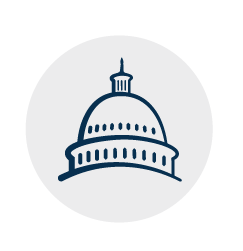AHCIA & FY 2024 Budget Updates; White House Affordable Housing Announcements
As Congress prepares to leave for its August recess, we wanted to take this opportunity to thank you for your extraordinary efforts to secure cosponsors for the Affordable Housing Credit Improvement Act (AHCIA). We are pleased we were able to help our House champions reach their goal of achieving 150 bipartisan cosponsors before the break. We are also very pleased to report that 28 Senators (14 Republicans and 14 Democrats) have cosponsored the AHCIA as well. This means we have over a third of the House and almost a third of the Senate supporting expansion of the LIHTC. But there is more work to be done to strengthen our position for action on the ACHIA this year. While your Members of Congress are back in their states and districts in August, we hope you will reach out to them in support of the AHCIA. If they have cosponsored the bill, please thank them, and if they have yet to join, encourage them to do so.
We also wanted to give you an update on recent House and Senate action on Fiscal Year 2024 funding for HUD programs. The House Appropriations Committee reported its Transportation, Housing, and Urban Development, and Related Agencies (THUD) funding bill on July 18th and the Senate Appropriations Committee approved its legislation on July 20th. The House version is significantly less than the Senate proposal and both proposals are woefully under what HUD needs to fund programs at current levels. It is unclear when the full House and Senate will consider their respective THUD bills, although it is possible there could be some informal discussions between the two bodies during the August break to find common ground on HUD funding levels.
Highlights of House and Senate funding for HUD programs include:
Project-Based Rental Assistance (Senate: $15.79 billion; House: $15.82).
Tenant Based Rental Assistance (Senate: $31.7 billion; House: $31.1 billion).
Public Housing Fund (Senate: $8.87 billion; House: $8.36 billion).
Community Development Block Grant Program (CDGB) (Senate: $3.3 billion; House: $3.3 billion).
HOME Investment Partnerships Program (Senate: $1.5 billion; House: $500 million).
Native American Programs (Senate: $1.2 billion; House: $1.24 billion).
Homeless Assistance Grants (Senate: $3.9 billion; House $3.72 billion).
Section 202 Housing for the Elderly (Senate: $1.07 billion; House: $913 million).
Section 811 Housing for People with Disabilities (Senate: $360 million; House: $208 million).
Choice Neighborhoods Initiative (Senate: $150 million; House: $0).
Family Self-Sufficiency (Senate: $140.5 million; House: $125 million).
Housing Opportunities for Persons with AIDS (Senate: $505 million; House: $505 million).
Funding for the federal government runs out on September 30th, which will give Congress very little time to act on many, if any, of the twelve appropriations bills necessary to keep the government operating. This likely will force consideration of a stop-gap funding bill in order to avoid a government shutdown. Many, however, are concerned that opposition by some House Republicans to an omnibus stop-gap funding bill could lead to a government shutdown. As an alternative, it is possible the House could consider packaging some appropriations bills into so-called minibuses and providing stop-gap funding for others. The Senate, meanwhile, is working on a bipartisan basis to advance its appropriations bills, and also is considering using the minibus approach to move legislation more quickly.
Finally, we wanted to share fact sheets released today by the White House on housing supply and renter protections. These include:
Reducing barriers to affordable housing, with a new HUD grant program for state and local zoning reform and incorporating land use and zoning into more federal transportation and economic development programs.
Expanding financing for affordable and climate resilient housing, including new climate funding that can be used for housing, raising the FHA large loan limit, new streamlining actions, and new guidance for the RAD program.
Promoting commercial to residential conversions, with a new Administration initiative to identify sources of federal funding and identify and market surplus federal properties that represent the best opportunities for conversions.
Ensuring fair tenant screening practices, with new guidance and best practices on informing renters of what information in their screen report is responsible for their application being denied.
Funding tenant education and outreach, with a new HUD grant program.
Providing more time for tenants to avoid eviction, with a commitment for a HUD notice of proposed rulemaking that would require that tenants of public housing and properties with project-based rental assistance receive a written notice at least 30 days.
We continue to engage in close conversations with the White House on a number of potential solutions to address the affordable housing crisis. In that regard, we would welcome your comments and feedback on these most recent announcements by the White House.

